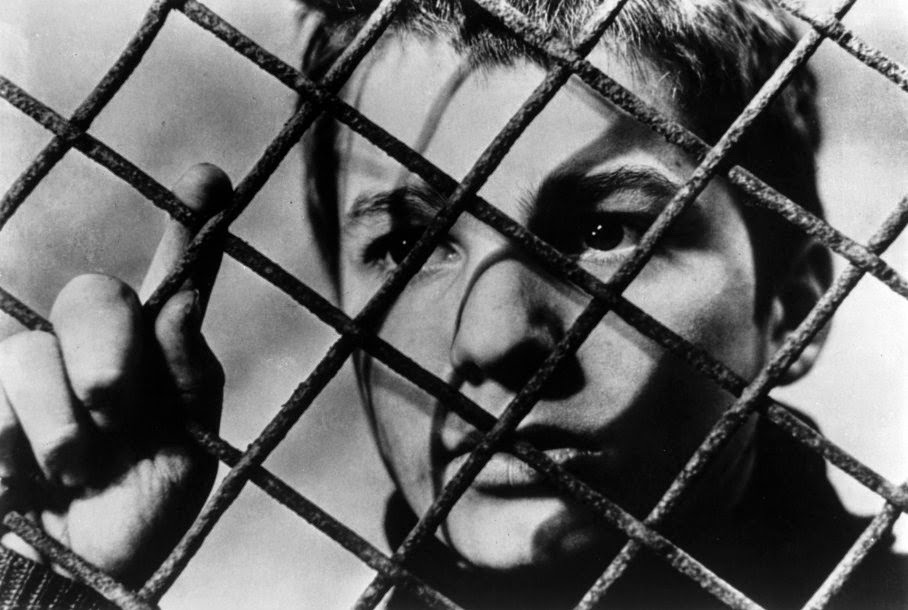The 400 Blows (Les quatre cents coups)
The 400 Blows (Les quatre cents coups)
(1959)
A Review by Grant Kanigan
Directed by: Francois Truffaut
Written by: Francois Truffaut & Marcel Moussy
Starring: Jean-Pierre Léaud, Claire Maurier,
Albert Rémy
Rating: No Rating
Release Date: November 16th, 1959*
 |
| Jean-Pierre Léaud in The 400 Blows Image Source |
Living in a microscopic apartment in downtown Paris with his mother Gilberte, (Claire Maurier), and stepfather Julien, (Albert Rémy), Antoine is often left alone, to fend for himself, only talking to his parents over dinners that consist of flavoured broth or vegetables. It seems as if the family is poor, yet we first meet Julien after buying an expensive fog light, his mother after she goes out on the town, and see all three of them drive around Paris in a vehicle. Julien and Gilberte have money - they just don't invest any of it in Antoine. His mother even goes so far as to spend money for Antoine's bedsheets on herself, leaving him to slumber in a sleeping bag in a cramped hallway. His school is no different. In a dank, cold classroom, the students in Antoine's French classroom, are terrorized by the brutally cold attitude of Petite Feuille, (Guy Decomble), the French teacher. Often screaming at his students, punishing the underserving and psychologically terrorizing them, he runs his classroom less like a learning institution and more like a prison. It's not until Feuille punishes Antoine in front of the entire class, that Antoine's rebelliousness is set in motion. With only one classmate at his side, Antoine decides to run away from home and face the harsh sociological climate of Paris by himself.
While the plot is somewhat important in a film like this, if only to understand Antoine's motivation, it's secondary to the picture as a whole. Much like the far inferior Boyhood, Truffaut's The 400 Blows is a film about moments. While simple comments like, "I wasn't planning on having a son" or a quick kiss with a coworker mean virtually nothing to his mother, to Antoine, they are Earth shattering. Or when he's asked to write an essay that is truly important to himself and plagiarizes Honoré de Balzac, he doesn't consciously intend to steal from the famed author. The words Balzac chose to write regarding death strike Antoine as intensely personal, as he felt the same emotions when his grandfather died. What Antoine does isn't so much plagiarism, but more homage. With nobody at home to rely on, and a teacher more interested in punishment than pedagogy, it's no wonder Antoine rejects where society has placed him.
The 400 Blows, while is at it's core a simple tale of rebellion and coming of age, has some universal themes; the constraints society places on those who are different, how matriculation has a habit of institutionalizing and making bland the most inventive of people, and how cruel the world can be. All Antoine wants is to be free, and to not be a burden to anyone, and society won't even let him. Within the closing shots of the film, it's not apparent what will happen to Antoine in the future, or even if he'll survive, but at least he's the master of his own future, on his own terms. That's all most people want.
While the hypnotic, beautiful black and white cinematography is inventive and interesting all on its own, it's importance in the annals of cinema is equally exciting. Films like Midnight Express, Taxi Driver and many more owe their structure and visual eye to Truffaut's late 50's masterpiece. Terrence Malick, arguably the best visual director of our time, takes some of his cues from Truffaut, and it seems as if his wonderfully vibrant and experimental Tree of Life is somewhat of an homage to The 400 Blows. At only 99 minutes, Truffaut's tragic, compelling and timeless story truly captures the angst of coming of age, and, unlike some awful imitations, actually has something to say about it.
The 400 Blows, while is at it's core a simple tale of rebellion and coming of age, has some universal themes; the constraints society places on those who are different, how matriculation has a habit of institutionalizing and making bland the most inventive of people, and how cruel the world can be. All Antoine wants is to be free, and to not be a burden to anyone, and society won't even let him. Within the closing shots of the film, it's not apparent what will happen to Antoine in the future, or even if he'll survive, but at least he's the master of his own future, on his own terms. That's all most people want.
While the hypnotic, beautiful black and white cinematography is inventive and interesting all on its own, it's importance in the annals of cinema is equally exciting. Films like Midnight Express, Taxi Driver and many more owe their structure and visual eye to Truffaut's late 50's masterpiece. Terrence Malick, arguably the best visual director of our time, takes some of his cues from Truffaut, and it seems as if his wonderfully vibrant and experimental Tree of Life is somewhat of an homage to The 400 Blows. At only 99 minutes, Truffaut's tragic, compelling and timeless story truly captures the angst of coming of age, and, unlike some awful imitations, actually has something to say about it.
Grant's Rating: 5/5 Stars
The 400 Blows clip: "Physical Education"
* The 400 Blows is available on a lovingly packaged Criterion Collection DVD/Blu-Ray Combo available now.



Comments